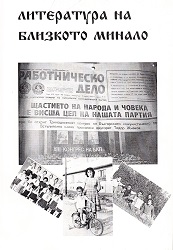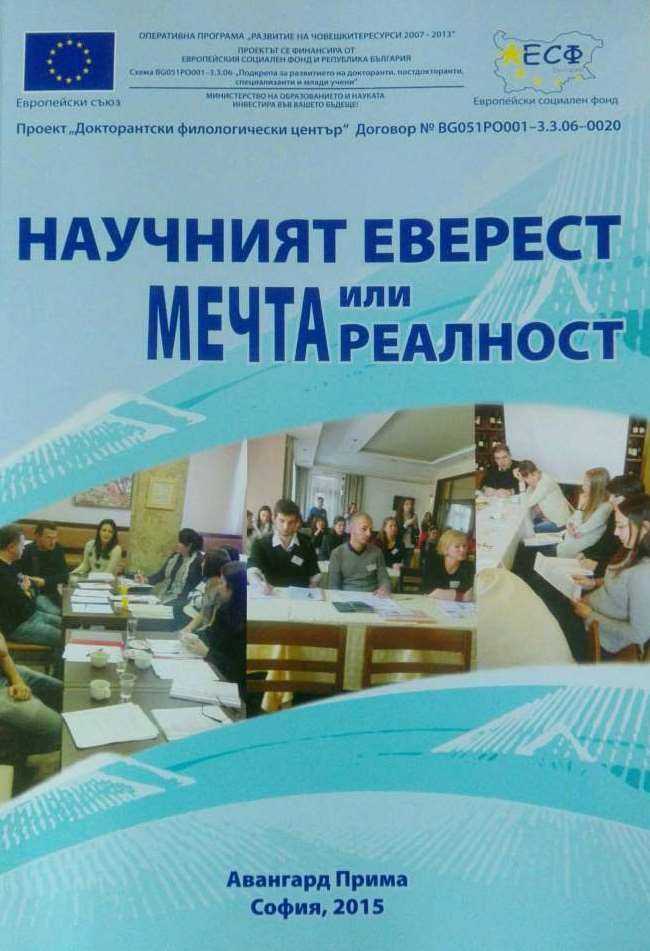
We kindly inform you that, as long as the subject affiliation of our 300.000+ articles is in progress, you might get unsufficient or no results on your third level or second level search. In this case, please broaden your search criteria.


The article deals with the idea of the visible and invisible stairs and steps in literary texts, the ascents and descents (both literal and figurative) along the ladders of the structures and literary borders. During the years of socialism the stairs were a trivially used symbol of going up, conquering heights, an uninterrupted ascent to the highest possible political step – that of communism. Consequently, this also meant the coming of the end of history because beyond this highest level there could not be any other. In the article, this idea is revealed against the background of Flying Heroes and Wayside Dwellings in the collection of Gencho Stoev’s works “Like a swallow”.
More...
This paper focuses on the reader books in the period between 1947 and 1986. The choice of the literature texts and ideological problems in the children`s education are analyzed.
More...
The key role of the construction worker in the building of the sacred communism in Bulgaria is a leading motif in the most of Penio Penev’s poetry works. Proletarian poet most often glorifies the importance of the new man, the man-constructor and his labour efforts, speaking on behalf of the nation in poems such as "His Majesty the Man", "Corpus 206", "Building Spring" and etc. In the majority of Penio Penev`s poetry, he presents the shock-worker as a basic constructive element of the Bulgarian communism’s utopian dream. Penev is generational related to the historical period from the late 40s and early 50s of the Twentieth century, in which he formed himself as a mature creative person. His short poetic life is a series of rise and fall, as it happens with his attitude towards life in general. However, the topic of the construction concentrated on the image of the worker as an engine of a new technical time is a key one and accompanies the author till the very end of his life, which coincides with the loss of relevance of this type of themes in the Bulgarian poetry of the early 60s of the Twentieth century.
More...
The main attention in the article is focused on how social issues are reflected in Marya Grubeshlieva’s works, written before, during and after the Second World War and published in the collected works, entitled „On the threshold” (1955). Internal strategies that determine the nature of fabulation are discussed in terms of utopian social project which Communist Party imposes on the agenda of modern Bulgarian society. In the article is paid attention on the ways in which the authoress tries to create literary texts, subject to the new method in art – socialist realism.
More...
This article suggests an attempt for analysis of the famous literary work by Ilia Volen. Its aim is the interpretation of the inner state and psychology of the main character – the former priest Nikolay Nazarov, - that is tragically split between humility and theomachy. His own inner contradictions and his relationships with relatives (his wife Johna, their son Stephan) and especially with God are also studied. Stephan’s death appears to be a crucial moment in the development of the plot because it becomes a reason for change of Nazarov’s view about life and radical transformation of his attitude towards the religion.
More...
The text focuses on the politics of self-fashioning and the strategies for constructing of the autobiographical self in memoir literature, written by Bogomil Raynov, key figure in Bulgarian intellectual life during the socialist period. Raynov creates a character, who influences the establishment of tendencies, the opinions of some specific political figures and some concrete forms of party politics from a position, set in a complex relation to the official “seat” of power, thus having not really ideological, yet still authoritative place in the formation of the aesthetics and politics of the period. The analysis attempts to show that the reflexive self-fashioning of the intellectual in a situation of a repressive regime, done in the context of an always selective life-narrative, relies on diverse strategies for legitimizing of an image of life, in which the integrity of the subject is impossible.
More...
The article studies the poet Ivan Metodiev’s magazine, named Nava as an essential conceptual attempt to understand the world, time and poetry from a point of view which was new to Bulgarian literature – on the borderline between Eastern and natural philosophy and Wittgenstein’s analytic philosophy. Apart from the relation with the eastern forms, these short fragments are rooted in the ancient cultural traditions in Bulgaria. This philosophy of history has its own cosmogony and bears a great deal of positivism.
More...
The play “The trial against the Bogomils” by Stefan Tsanev went out in a typewritten form in 1969 and has not been on Bulgarian stage at the time. The reason is that the party circles at that time perceive the text as an allegory of the political reality of the 60’s in Bulgaria and in the prototypes of the characters they see the authority – `The first` (Todor Zhivkov) and the `Princess` (Lyudmila Zhivkova). In reality, the play turns out not as a ‘hystorical tragedy’, as its author represents it, but rather as a parody of the theater of power. The playwright achieves this effect by means of pictures, revealing the theatricality of the different forms of social life (‘the theatre’ of the court, of history, of the royal institution). The ideology of the Bogomil religious (and the alongside passed parallel with the communism) is strongly and sarcastically diminished by the elements of commedia dell ’arte, burlesque and commedia fool, used in the play.
More...
This article presents the struggle for spiritual survival in the book of poetry “Cry from the Prison” of the poet Joseph Petrov created in captivity during the writer's stay in the Belene concentration camp. Writing camp poetry is not only a protest against violence and acts of dehumanization, but also a process of purification and recovery from the suffered humiliation. The text focuses on the power of the speech, which on one hand causes the imprisonment of the artist, but on the other hand relieves his suffering. Poetry is a kind of self-communication which combines the memories, the imaginary world of the character and the surrounding reality through which the author overcomes the boundaries of the "spiritual" prison. In this sense, the very act of creation is an attempt to preserve his spirit and identity and serves a specific verbal revenge over the torturers. Popularization of the Bulgarian camp poetry will help for a better understanding of the socialist period.
More...

This article studies the biographical aspects of the poem „Visiting my Home Paper Mill”. It reviews several versions of the poem and compares them. The action in the poem is followed chronologically and sequentially. The study aims at proving that Binyo Ivanov's poetry often contains references to his own life and if it is interpreted through this prism, it would become more clear and understandable.
More...
This paper studies the literary tales of Vesa Paspaleeva between the two world wars. Her original tales, which have features of her individual style, are reviewed. The paper is an attempt to identify certain thematic and storytelling features and provide comments of the paratext of these works.
More...
This paper studies two modernistic poems – „Zatochenici” (P. Yavorov) and „Septemvri” (Geo Milev). Some relations between the two poems are shown: their connections with certain historical event, the crash of the national ideal for unity, the journey – by boat in „Zatochenici” and from night to dawn in „Septemvri”, the concept of the mother land, the lost paradise and the paradise on Earth.The conclusion shows how in a work known as a patriotic poem we find symbols of modernism and in a modernistic poem we find symbols of Bulgarian cultural history.
More...
The relationship between the village and the city as literary subjects in the works of Ivan Vazov, Mihalaki Georgiev, Stamatov, Todor Vlaykov, Georgi Raychev, Anton Strashimirov for the most part acquires an adversative nature. The parameters of this opposition could be found in the separate areas of the lives of the citizen and the villager: the toponymic system, the types of contact in the village and the city, the problem of labor in both social structures etc. The subject of suffering of the patriarchal man and the citizen reveals a specific relevance between the two social structures (village, city), which is characterized by blurring the borders of the opposition between them, erasing the contrasts, and re-conciliating the characters of the villager and the citizen in one collective persona of the suffering man.
More...
This paper focuses mainly on how Bulgaria is described and how the Bulgarian national character is presented in the novel „Apostoloff” by German author of Bulgarian origin Sybille Lewitscharoff. Our main goal is to study which specific segments of Bulgarian reality are selected and how they are relevant to the personal memories of the narrator. We will also analyze the artistic resources, which contribute to the construction of foreignness in the image of the Bulgarian.
More...
This article studies the characters of the narrator in the novel „The World Is Big and Salvation Lurks Around the Corner” (1996/1997) by Ilija Trojanov. It studies how the changes of the narrator in different fragments of the novel are connected to build the plot. The article also reviews the functions of the narrators by creating images of man and world.
More...
This report describes the changes in children's literature, which was put under the total control of the ideology that came into power after 9. IX. 1944. After that date, the poetry for children was primarily meant to serve the tasks of the Communist upbringing and propagate the values of the doctrine among the youngest citizens of the People`s Republic. The present report shows the strong commitment of the children’s literature with the power, as well as its gradual liberation from the ideological control. As an ideological and aesthetic trend, socialist realism, like any other phenomenon in the cultural sphere, is subjected to the changes in the sociopolitical life, and in this paper we follow its transformations in the period 1944-1989.
More...
The current report aims at following the empirical and rational ways of human knowledge and their adequacy through the character of someone’s double in the science fiction novels „Intra” by Nedialka Mihova and „Clones” by Vesela Lyutskanova. We focus on several issues: How is human knowledge functioning? Is the human way of understanding universal? Are we willing to ignore humanity for the sake of science? The double’s materialization is made possible through technology and becomes a scientific method to expand its knowledge of the surrounding world. The knowledge gained by the characters in the novels affirms their individuality, despite their unnatural „creation” and existence.
More...
This report aims at revealing the character of communist woman in the poetry of Pavel Matev and Vladimir Bashev. We focus on several issues: what happened in Bulgarian poetry after 1944 and how the communist party intervened into culture, art and literature. This report will show how the woman was pictured in the poetry during this period and why she was transformed into a cliché.
More...